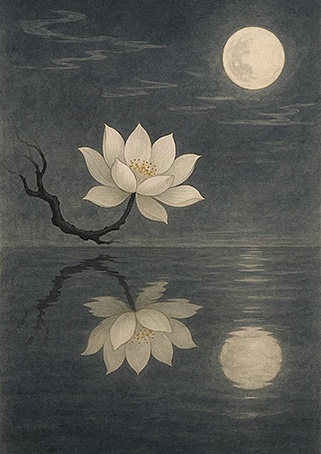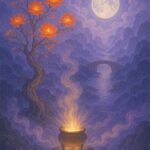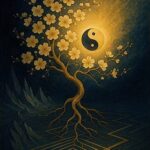Xieyi・The Rootless Tree:100 Verses-Outer Verse 2#419

The poems of “The Rootless Tree” express a fundamental force rooted in harmony with heaven and earth, the cyclical flow of yin and yang, and the infinite potential of existence。
This painting is an expressive “Xieyi” in the tradition of “futu” (spiritual diagrams), passed down for generations in Wudang Mountain, China. It is drawn through a technique where energy flow (xingqi) channels the internal intention into visual form。 In the Taoist world, there exist spiritual and symbolic images called “futu”。
In the Taoist world, there exist spiritual and symbolic images called “futu”。
These are a type of talisman—not merely religious items, but expressive spiritual paintings that act directly on the mind of the viewer。
Since ancient times, many people have placed these Taoist-style “Xieyi” and futu in their homes, studies, or bedrooms, wishing for longevity, health, auspiciousness, and family harmony. Viewing such paintings was not just aesthetic appreciation, but an act of inviting the presence of the Dao into one’s life and tuning the body and mind。
Thus, “Xieyi” is more than artistic expression—it is a medium that bridges the spirit, life, and harmony with the universe。
This kind of artwork is not meant to be seen only with the eyes, but felt with the heart。
It communicates with the Dao, resonates with the qi of nature, and quietly stirs the viewer’s inner self。
Futu and “Xieyi” continue to live on from ancient times to this day as “sacred images that speak to the soul.”
Below, we present the original text of the philosophical poem “The Rootless Tree,” along with a modern Japanese translation and interpretation。
※ The author of “The Rootless Tree,” Zhang Sanfeng (1247–?), is also renowned as the founder of Tai Chi, and it is said that he applied the essence of this work to Tai Chi. As an additional note, we include an interpretation connecting this to the Tai Chi tradition of Wudang Mountain.
The Rootless Tree:100 Verses-Outer Verse 2

Original Text
無根樹,花正靜,風來不動影分明。不驚不懼真如水,澄澈心中見月明。
Modern Translation
A quiet flower opens on the rootless tree.Though winds arrive it does not stir; its shadow stays clear.Unstartled and unafraid, its mind is limpid water mirroring a full moon.
Interpretation
[無根樹,花正靜] Quiet bloom—steadfast composure.[風來不動影分明] Wind comes, yet the shadow remains crisp.
[不驚不懼真如水] Unfrightened heart—truth like still water.
[澄澈心中見月明] In clear depths the bright moon appears.
Interpretation related to Tai Chi
Stability resists external force.
A still center keeps form intact.
Calm‑water mind births real power.
Clarity of heart reveals intuitive timing.
Copyright © MASAKI WAKABAYASHI. All rights reserved.




